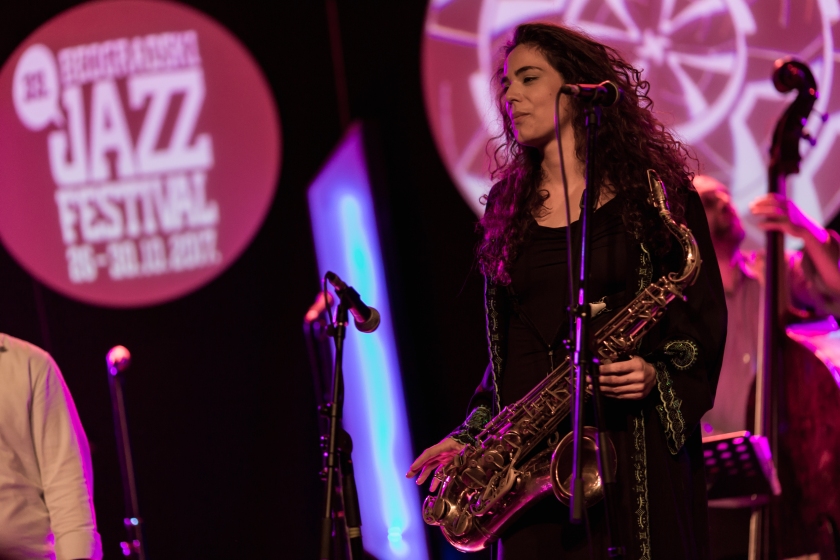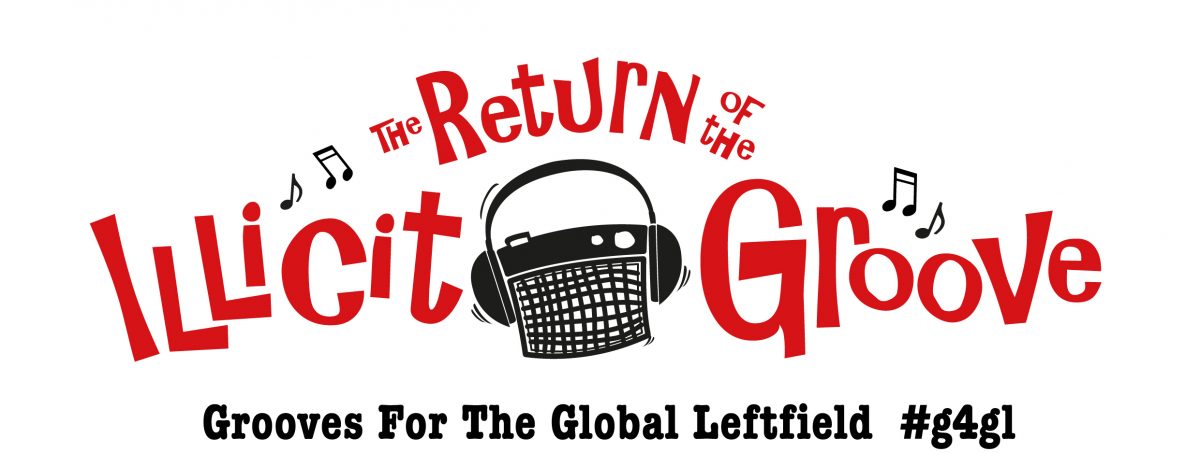There’s a buzz going around the UK airwaves at the moment, not least on The Illicit Grooves Radio Show , and it’s a buzz created by a Jazz artist and her album Ascension. That artist is instrumentalist, composer, arranger and singer, the Belgrade based, Sanja Markovic.
Arranged by publicist and Belgrade DJ Milena Nikotovic, Sanja and I met in a bar at the bottom of Zadarska in the Kosancicev Venac area of Beograd’s old town; all cobbled streets and overlooking the River Sava just before its confluence with the Danube. In uncharacteristic 30 degree late October freak weather Sanja and I were able to sit outside in the full Sun and rather like Austro-Hungarian boulevardiers and bohemians we drank and talked about music, art, the artistic process, our shared love of Public Enemy and how Coltrane links with Rachmaninoff.

I started by asking Sanja how Jazz came into her life
‘Well, the thing I fell in love with, at live gigs, is that these musicians are storytellers. Jazz is a very intimate and very rich language in which they speak. You see all their agitations and mistakes and all their turmoils inside. It’s something that other music does not have that much. You can in classical but in Jazz it’s one-to-one, it’s direct. I was fascinated with the harmonies, the sound the arrangements, the different combinations of sound.’
So was this when you were studying Jazz in the States?
Here Sanja laughs. ‘I studied Jazz by sitting at gigs and listening. I was fascinated by the nightlife and mostly I just would hang out at Jazz gigs and suck it all in, soak it up like a sponge. I went to elementary school in the States and then came back to Belgrade for High School but I would return every year to keep up my US status and visit friends and hang out in Jazz clubs. I used to just go to clubs on my own, firstly in Washington DC and then in New York.’

We went on to discuss how Sanja sees herself within the roles of composer, vocalist and instrumentalist.
‘First I am a composer and the second is vocalist. The instrumentalist part is where I hear an instrument and try to learn it. I work mostly at the piano, when I was a member of The Brazilian Jazz Collective I played guitar and the Saxophone is just one big love and I’m still on the path to get myself where I want to be.’

So, how did the saxophone come into your life?
‘Oh,…of course John Coltrane was one of my first loves, and Wayne Shorter and his music and compositions was a great influence on my music. His playing is almost impulsive and I loved that in every note he plays.’

As a vocalist do you improvise?
‘In Jazz yes, I love taking on parts which Mark Murphy sang and pull out some rare gems to use on stage.’
I then went on to ask Sanja about her, as yet, unsigned album Ascension and the psychology of creating an album of eight tracks where six of which are her own compositions, one co-written and one an interpretation and arrangement of a Francy Boland composition. With that amount of personal creative input into the album were there parental or maternal feelings about Ascension?
‘Yes, of course..laughs..and you wouldn’t imagine to what extent. All of these themes have been entwined in my life for quite a while. Some of the songs were made up just before the recording, It Has Always Been came to me as I was sat in a cafe. There are a number of songwriting and composition processes which went into the making of Ascension.’
‘As I said, with It Has Always Been it was just sitting in a cafe and the words came first. It sounded like a mantra, it had a rhythm to it which sort of gave me the groove. The rest of it was me sat at a piano and improvising and then it just happens. Sovereign State Of Mind originally was a solo piece for the piano so what I did was I started from the title, which just came to me, then worked the lyrics from there. It was my life story up to that point in time. The theme for Zhega actually was born in a dream…the theme came in a dream and I woke up and just quickly wrote it down. That track was done at the end, we weren’t sure we would get the clearance for the Francy Boland track (The Mystery of Man) and we needed another track and I dreamt it.’
‘All the tracks have meaning to me, they are all autobiographical, especially (the title track) Ascension. I wanted to communicate much deeper with the music than what was actually communicated in the words, Walt Whitman’s poem, but it came out good.’
As a child and as a teenager what music were you buying and listening to?
‘I was lucky to grow up in a musical family, we listened to classical music at home, my Father loved Bach. I grew up on The Beatles and we would sing their songs around the piano or driving to the sea and I would catch the third voice in the harmony and I was always impressed with their (The Beatles) harmonies. I’d listen to Simply Red, I listened to Toto when I was a teenager. Then of course came The Doors and a lot of alternative music from Seattle like Nirvana, Pearl Jam, Sound Garden and my favourite band from then, Alice In Chains.’
‘My brother, who was studying piano, and I met Jason Marsalis and Wynton at the Eastern School of Music and through those acquaintances triggerd my love (for Jazz). I was also listening to Sting at the time like nothing else in my life, the first album Dream of The Blue Turtle was also something that led me closer to Jazz music. In fact the themes in Ascension, especially where the strings come in really do evoke my memories of listening to Dream of the Blue Turtle…and Toto too, they would be proud of me’…laughs.
‘Steely Dan I loved, Yellow Jackets, the Pat Metheny Group I listened to a lot.’
So, just to end then, if you were going on a journey and could only take six CDs with you what would they be?
Shakti – A Handful of Beauty
Sting – Dream Of The Blue Turtles
Wayne Shorter – Speak No Evil
Miles Davis – A Kind Of Blue
Rachmaninoff – Isle of the Dead
Sahib Shahib – Companionship

